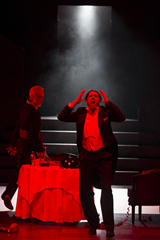| Opera Reviews | 20 April 2024 |
Ildebrando D'Arcangelo stamps his mark on an otherwise mixed Don Giovanniby Moore Parker |
|
| Mozart: Don Giovanni Salzburg Festival 9 August 2016 |
|
|
Sven-Eric Bechtolf’s production of 2014 sees several changes to the line-up this time round including conductor Alain Altinoglu, who here makes his Festival debut. Returning to their roles are Luca Pisaroni (Leporello), Alessio Arduini (Masetto) and Valentina Nafornița (Zerlina). Bechtolf’s updated - if rather unspecific - concept features a one-set structure comprising a open-plan hotel foyer with a central split staircase which leads to chambers of lust on the upper level. A wheeled-in wedding cake slickly transforms the bar into a reception area for the nuptials, while a column and marble bust of the Commendatore’s head serve for the finale. The concept works well for the lead, who sprints in all directions while chasing any attractive female within reach, mounts a luggage trolley stacked with suitcases like an athlete, and convincingly tosses off his Champagne aria exposing sharpy-defined biceps while sitting on the bar counter. Leporello, bespectacled and slightly awkward in gait (and with a dependency on some substance which he enjoys inhaling through his nostrils) indeed personifies an antipode to his sex-charged master, but also runs the risk of blandness against such competition. Luca Pisaroni appears somewhat lightweight and unvaried in vocal palette and, alas, rather pale and nerdy in this setting - despite his familiar qualities as a fine singing-actor. Nicely-contrasting in vocal and physical stature with D’Arcangelo’s Don, Alessio Arduini’s freshly feisty Masetto who - while easily trounced by his stage rival - nevertheless proves his mettle both in action and in his compact vocal showing. His sweetheart, Zerlina, is a touch taller in stature - a shade overbearing and perhaps a little too wily or “knowing” for the music Mozart granted the character. Indeed, Valentina Nafornița (for all her assets) seems a touch miscast here, vocally pointing toward heavier repertoire and rather lacking the lightness and sparkle which lends this role its youthful charm. Paolo Fanale brings good looks, much lyricism and an appealing timbre to Don Ottavio (and the necessary breath control for infamous scales of “Il mio tesoro"), but somewhat lends a sense of focusing upon his vocalisation rather than possibly unearthing more marrow in this (admittedly easily vapid) figure. New to the cast, Carmela Remigio - whose Donna Anna scores in its moments of anguish and fury (with particularly strong delivery in the recitativi), but whose unevenness of line and legato present issues in her soli and, to some degree, in the ensemble scenes. Layla Claire’s Donna Elvira - intense and unflinching in pursuit - has a weakness for the bottle, and eventually seeks solace through taking her vows. The Canadian soprano can boast a well-schooled instrument showing eloquent agility and an upper range which blossoms nicely above the stave. Her “Mi tradi quell’alma ingrata” was one of the evening’s highlights. Currently cast as Timur in the current Bregenz Festival’s Turandot, Finnish bass, Mika Kares substituted as the Commendatore in this performance. With his imposing stature (almost a head taller than D’Arcangelo) and a solid metallic ring to his tone, he easily makes his mark. Not to be thwarted by anything or anyone, this Giovanni rises like a phoenix at the finale, donning Satan’s mask to continue pursuit of his passion with a sly grin as the curtain comes down.
|
|
| Text ©
Moore Parker Photo © Salzburger Festspiele / Ruth Walz |

 The ace of this Salzburg revival is the tour-de-force showing by Ildebrando D’Arcangelo in the title role - now, arguably at his zenith in this particular part both vocally and interpretively. Whether in full thrust forte or in sotto voce asides, he dominates the action with aplomb in a performance combining nonchalant stage craft, superb vocal prowess, and the physical attributes to make him an ideal Don - if not indeed, THE Giovanni of our day.
The ace of this Salzburg revival is the tour-de-force showing by Ildebrando D’Arcangelo in the title role - now, arguably at his zenith in this particular part both vocally and interpretively. Whether in full thrust forte or in sotto voce asides, he dominates the action with aplomb in a performance combining nonchalant stage craft, superb vocal prowess, and the physical attributes to make him an ideal Don - if not indeed, THE Giovanni of our day. 





